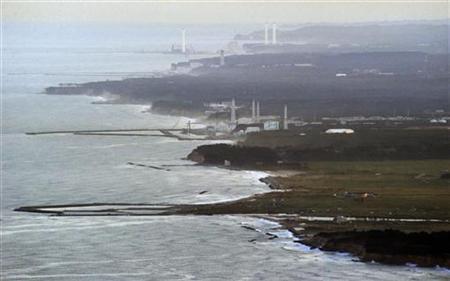Nuclear sector seeks to regain trust after Fukushima
Date: 14-Sep-12
Country: UK
Author: Karolin Schaps

An aerial view shows the tsunami-crippled Fukushima Daiichi nuclear
power plant in Fukushima Prefecture, from over the Pacific off
Minamisoma, in this photo taken by Kyodo September 11, 2012, to mark
the one and a half years anniversary of the March 11, 2
Photo: Kyodo
The global nuclear industry, traumatized by Japan's Fukushima accident 18 months ago, needs to redefine itself to regain public trust and better cooperate to improve safety, senior executives of the sector said on Thursday.
The worst such accident in 25 years laid bare the industry's dependence on public confidence as governments in countries such as Germany, Switzerland and Belgium promised their voters to pull out of nuclear energy as soon as possible.
Although the order books of large nuclear companies were hit hard after the disaster, with forecasts for new nuclear capacity projecting a fall by 12 percent by 2020, other major economies are pushing ahead with nuclear newbuilds despite Fukushima.
"We need to make a collective effort to restore our reputation and to rebuild the nuclear brand," Luc Oursel, chief executive of France's flagship nuclear reactor producer Areva, told an industry conference in London.
With almost 80 percent of its domestic electricity generated from nuclear power plants, France has the world's highest share of nuclear energy and Britain, China as well as the United States are planning to build several new nuclear power stations.
Areva is contracted to build nuclear reactors in many sites around the world.
Oursel said it was more important than ever to be open about nuclear operations and that the industry as a whole should support colleagues in Japan to restore public confidence after one of the country's Fukushima nuclear reactor leaked radiation following a tsunami in March 2011.
Japan has seen widespread anti-nuclear protests in recent weeks as it decides whether to ditch the technology forever.
Fukushima and events such as the recent discovery of cracks in a Belgian nuclear reactor have dented the public's confidence in the safety of nuclear power.
"What came down at Fukushima was more than a seawall. March 11 was an error," said Ric Perez, president and chief operating officer of Westinghouse, also a leading nuclear company and majority-owned by Japan's Toshiba.
Perez said it was the sector's obligation to continue to improve safety and address points of contention as a collective industry rather than companies from different countries.
Even though the impact of Fukushima was undeniable, the global financial crisis is also taking its toll on new nuclear project development as customers find it hard to raise finances to cover the high upfront costs, Kirill Komarov, deputy director general of Russia's Rosatom, Russia's state nuclear power corporation, told the conference.
The International Energy Agency (IEA), which advises industrialized countries on energy, says nuclear energy is important as a low carbon source of power to support the rise of renewable power generation supply.
(Additional reporting by Henning Gloystein; editing by James Jukwey)
![]()
© Thomson Reuters 2012 All rights reserved